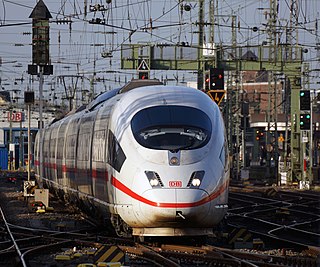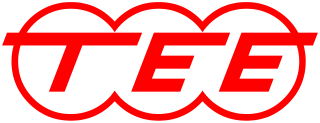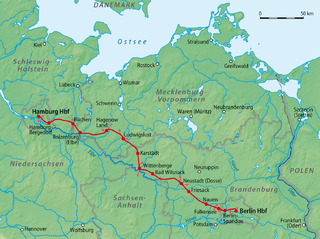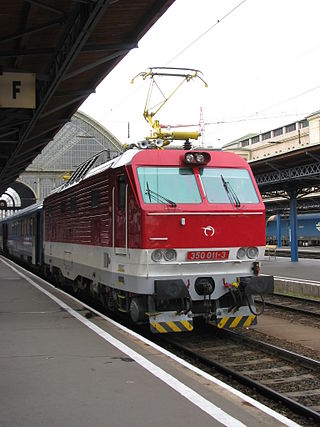
Inter-city rail services are express trains that run services that connect cities over longer distances than commuter or regional trains. They include rail services that are neither short-distance commuter rail trains within one city area nor slow regional rail trains stopping at all stations and covering local journeys only. An inter-city train is typically an express train with limited stops and comfortable carriages to serve long-distance travel.

The Deutsche Bahn AG is the national railway company of Germany, and a state-owned enterprise under the control of the German government. Headquartered in the Bahntower in Berlin, it is a joint-stock company (AG) and the largest railway company in the world.

As of 2021, Germany had a railway network of 33,399 kilometres (20,753 mi), of which 20,540 kilometres (12,760 mi) were electrified and 18,556 kilometres (11,530 mi) were double track. Germany is a member of the International Union of Railways (UIC). The UIC Country Code for Germany is 80.

DSB, an abbreviation of Danske Statsbaner, is the largest Danish train operating company, and the largest in Scandinavia. While DSB is responsible for passenger train operation on most of the Danish railways, goods transport and railway maintenance are outside its scope. DSB runs a commuter rail system, called the S-train, in the area around the Danish capital, Copenhagen, that connects the different areas and suburbs in the greater metropolitan area. Between 2010 and 2017, DSB operated trains in Sweden.

InterCity is the classification applied to certain long-distance passenger train services in Europe. Such trains generally call at major stations only.

The Polish State Railways is a Polish state-owned holding company comprising the rail transport holdings of the country's formerly dominant namesake railway operator. The company was reformed in 2001 when the former Polish State Railways state-owned enterprise was divided into several units based on the need for separation between infrastructure management and transport operations. Polish State Railways is the dominant company in the PKP Group collective that resulted from the split, and maintains 100% share control, being fully responsible for the assets of all of the other PKP Group component companies.

The Trans Europ Express, or Trans-Europe Express (TEE), was an international first-class railway service in western and central Europe that was founded in 1957 and ceased in 1995. At the height of its operations, in 1974, the TEE network comprised 45 trains, connecting 130 different cities, from Spain in the west to Austria in the east, and from Denmark to Southern Italy.

The Polish railways network consists of around 18,510 kilometres (11,500 mi) of track as of 2019, of which 11,998 km (7,455 mi) is electrified. The national electrification system runs at 3 kV DC.

The Berlin–Hamburg Railway is a roughly 286 km (178 mi) long railway line for passenger, long-distance and goods trains. It was the first high-speed line upgraded in Germany to be capable of handling train speeds of over 200 km/h (120 mph).

The Vindobona is an international named passenger train which began service in 1957 between Berlin and Vienna via Dresden and Prague. In later years the route was extended to run from Hamburg via Berlin, Dresden, Prague, Brno and Vienna to Villach. It was named after the ancient settlement of Vindobona on the site of the modern city of Vienna. Labelled as a EuroCity train connection from 1993, services discontinued in 2014.

The word Mediolanum has been used to name three distinct international express trains that have run to and from Milano Centrale in Milan, Italy since 1957. The focus of these trains on the city now known as Milan reflects the fact that Mediolanum is the Latin word for ancient Milan.

Hungaria is a EuroCity train which runs between Budapest Nyugati and Hamburg - Altona, currently running with coaches of MÁV. It is numbered as EC 172-173 and runs daily, mainly with MÁV owned rolling stocks.
Interexpress is a former international train category. The word Interexpress is a short form version of the German language term Internationaler Express and its foreign language equivalents.

Varsovia, the Neo-Latin word for Warsaw, Poland, has been the name of two distinct EuroCity international express trains, each of them originating and terminating in Warsaw.
Progress was an express train between Prague, then the capital of Czechoslovakia, and the German Democratic Republic (GDR).
The Primator was an international express train. Introduced in 1986, it ran between Prague, then the capital of Czechoslovakia, and East Berlin, then the capital of the German Democratic Republic (GDR).
The Porta Bohemica is a EuroCity (EC) international express train. Since December 2014 it is operating between Hamburg-Altona and Budapest Keleti.
The Comenius has been the name of two distinct EuroCity (EC) international express trains, both of them originating, terminating or passing through Prague, the capital of the Czech Republic.

Wawel is a named international express train. Introduced in 1995 as an InterCity service, it was upgraded to EuroCity category by its operators PKP Intercity and DB Fernverkehr in 2006. The service was withdrawn at the end of 2014 but reintroduced in December 2020.

Eilenburg station is one of two railway stations in the district town of Eilenburg in the German state of Saxony. It is classified by Deutsche Bahn as a category 4 station. The station is located on the southeastern edge of the town.















